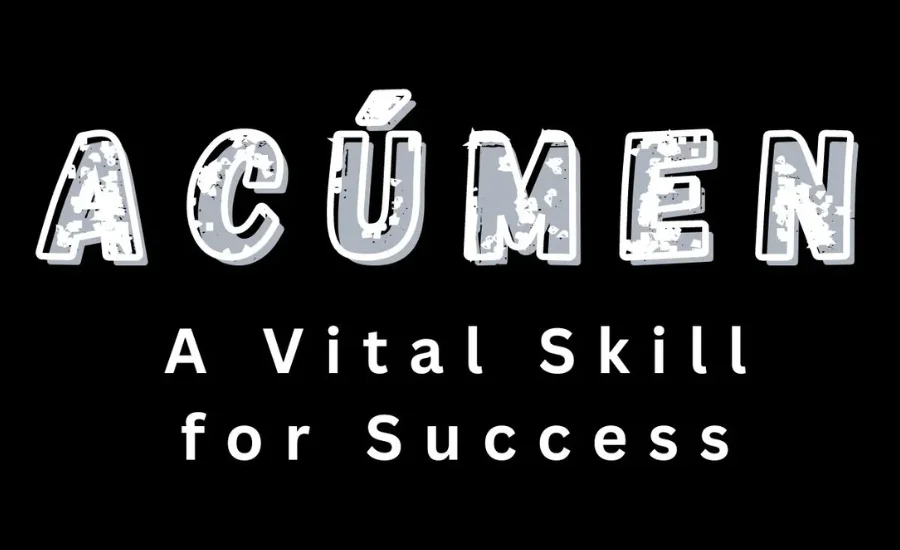Acumen is a powerful trait that transcends mere intelligence or experience, embodying the ability to make insightful decisions, navigate complex situations, and adapt to changing environments. From historical figures like Steve Jobs and Warren Buffett to strategic minds such as Sun Tzu, acumen has played a pivotal role in shaping the course of history and driving innovation. As we advance into an era marked by rapid technological change and globalization, the significance of acumen continues to grow. Understanding and cultivating this ability is essential for success in both personal and professional realms, as it empowers individuals to tackle challenges effectively and seize opportunities with confidence.
What Is Acumen?
Acumen refers to a deep and insightful understanding that transcends mere cognitive skills. Originating from the Latin term meaning “so be it,” it involves a combination of perceptiveness, practical intelligence, and swift decision-making. In today’s fast-moving world, acumen is crucial for navigating complex information and making informed choices quickly.
The Core Elements of Acumen

Acumen integrates various aspects beyond intelligence and wisdom. While intelligence focuses on cognitive abilities and wisdom emphasizes experience and knowledge, acumen involves the skill to swiftly assess situations, form reliable judgments, and adapt to changing environments. It requires seeing beyond the obvious, detecting patterns amid disorder, and devising effective strategies across different scenarios.
Historical Significance of Acumen
The notion of acumen has deep historical roots. Ancient societies valued individuals with exceptional acumen, often seeking their guidance and leadership. Notable figures such as Aristotle, Leonardo da Vinci, and Eleanor Roosevelt exemplified acumen through their groundbreaking insights and innovations in their fields.
Ways to Develop Acumen
Cultivating acumen involves a structured approach that includes self-awareness, continuous learning, and deliberate practice. Key strategies to enhance acumen include:
- Mindfulness Practices: These help improve awareness and focus, crucial for recognizing subtle cues and details.
- Critical Thinking Exercises: Activities that challenge assumptions and assess evidence strengthen analytical capabilities.
- Scenario Planning: Engaging with various scenarios helps in anticipating outcomes and adapting strategies effectively.
Key Aspects of Acumen
- Enhancing Observational Skills: Developing the ability to notice details, identify patterns, and interpret subtle signals is essential for sharpening insight and decision-making.
- Fostering Critical Thinking: Effective decision-making relies on challenging existing assumptions, evaluating evidence critically, and integrating diverse perspectives. This promotes well-reasoned judgments and intellectual humility.
- Improving Decision-Making Abilities: Successful decision-making involves evaluating options systematically, weighing risks and benefits, and taking decisive actions amidst uncertainty.
- Cultivating Adaptability: Adapting to a dynamic environment requires openness to change, managing ambiguity, and learning from experiences, which enhances resilience and agility.
By focusing on these components, individuals can enhance their acumen, leading to more effective navigation of complex and evolving situations.
Leveraging Insight Across Diverse Realms
Perception proves invaluable across countless arenas, including issue analysis, career progression, and personal bonds. By refining perception, people can enhance their conclusions, foresee potential obstacles, and maximize opportunities, leading to more pleasurable and prosperous outcomes.
Perception in the Corporate World
In the business domain, perception is a core asset for professionals, directors, and entrepreneurs. It enables them to identify emerging market trends, assess hazards, and seize chances, thereby fostering innovation and long-term growth. Organizations with strong perception are better equipped to adapt to market shifts, outperform rivals, and drive significant advancement.
Perception in Leadership
Effective leaders possess a special blend of vision, insight, and decisiveness. Their deep comprehension of human behavior, market trends, and organizational dynamics allows them to inspire and influence others effectively. Perception is essential for leadership, innovation, and corporate success. Prominent leaders such as Steve Jobs, Oprah Winfrey, and Mahatma Gandhi exemplify exceptional perception, leaving lasting impacts on their organizations and society through their visionary ideas and transformative actions.
Enhancing Personal Development Through Perception
Cultivating perception on a personal level fosters self-awareness and adaptability. It empowers individuals to navigate challenges, leverage their strengths, and continually refine their skills and perspectives. Beyond professional environments, perception plays a significant role in personal development by aiding in better decision-making, prudent resource management, and the building of stronger relationships.
Perception in Problem Solving
Effective problem-solving relies on perception to break down complex issues, identify root causes, and devise innovative solutions. It encourages a holistic approach that integrates critical thinking with creative problem-solving techniques, leading to more effective and original resolutions.
Benefits of Developing Acumen
Acumen offers numerous advantages, empowering individuals to make well-informed choices with confidence and achieve goals proficiently. It strengthens adaptability and resilience, allowing people to thrive in evolving environments and capably handle intricate issues.
Evaluating Levels of Acumen

Gauging acumen, though subjective, can be approached through various methods. Tools such as situational judgment tests, aptitude evaluations, and personality assessments provide insight into an individual’s acumen. Additionally, self-examination and introspection importantly contribute to examining and improving one’s acumen.
Challenges to Cultivating Acumen
Several obstacles can hinder acumen development. Cognitive biases, reluctance to take risks, and aversion to change are prevalent hurdles. Surmounting these difficulties necessitates perseverance, self-discipline, and a willingness to venture outside comfort zones.
Addressing Cognitive Limitations
Cognitive biases and preconceived notions can distort judgment and inhibit acumen growth. To counterbalance these biases, people must practice self-awareness and critical self-reflection to ensure clearer, more objective decision-making.
Navigating Unpredictability
A key aspect of acumen is the ability to manage uncertainty. Embracing ambiguity, maintaining resilience, and seeking clarity amid chaos are integral skills for effectively developing and applying acumen.
Integrating Acumen into Education
Incorporating acumen cultivation into educational curricula is vital for preparing students for modern life’s intricacies. Beyond traditional academic knowledge, students should be encouraged to develop critical thinking, emotional intelligence, and problem-solving abilities, which are fundamental for lifelong success and learning.
Ethical Implications of Acumen
While acumen provides significant advantages, it also raises important ethical considerations. Individuals with acumen should exercise responsibility, integrity, and empathy in decision processes. It is essential to avoid using acumen for personal gain or unethical purposes, ensuring responsible and ethical application.
Historical Figures Demonstrating Acumen
Throughout history, many influential figures have showcased exceptional acumen through their achievements and actions. Visionary leaders such as Elon Musk and Steve Jobs, along with strategic thinkers like Sun Tzu and Warren Buffett, have used their acumen to shape history and leave lasting impacts. Their ability to foresee trends, make strategic decisions, and innovate has cemented their legacies.
Debunking Common Myths About Acumen

Despite its importance, acumen is frequently misunderstood. One prevalent myth is that acumen is an inherent trait that cannot be developed, while another is the belief that it equates to manipulation or cunning. Addressing these misconceptions is crucial for fostering a clearer and more accurate understanding of what acumen truly entails.
The Evolution and Future of Acumen
As society evolves, the role of acumen is expected to grow in importance. Advances in technology, globalization, and shifting cultural dynamics will create new challenges and opportunities that require refined acumen. Embracing continuous learning and adapting one’s skills will be key to thriving in an increasingly complex and interconnected world.
Final Words
In a world where adaptability and informed decision-making are more crucial than ever, acumen stands out as a vital skill for navigating complexity and driving progress. By developing acumen, individuals can enhance their problem-solving capabilities, advance their careers, and foster stronger personal relationships. As society continues to evolve, the ability to harness and refine acumen will become increasingly important. Embracing lifelong learning and addressing common misconceptions about acumen will help individuals thrive in a dynamic and interconnected world, ensuring that they remain resilient, innovative, and prepared for future challenges.
For more infor mation join us on Celebz Wave

